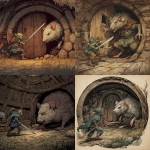Explore the Best AI Image Gallery

Quantum Leaps: How Quantum Computing is Revolutionizing Creative Industries
The realm of creativity has always been a space of innovation, pushing boundaries and redefining the way we express ourselves. Now, on the horizon, lies a revolutionary force poised to reshape the creative landscape even further: quantum computing.
While still in its nascent stages, quantum computing harnesses the principles of quantum mechanics to perform calculations at an unprecedented speed and scale. This immense processing power has profound implications for diverse creative industries, from film and music production to fashion design and interactive art.
Unlocking New Creative Dimensions
Quantum computings ability to process vast amounts of data opens doors to exciting new possibilities in creative fields:
- Generative Art and Design: Quantum algorithms can generate novel and intricate patterns, textures, and designs, enabling artists to create truly unique and awe-inspiring works.
- Realistic Simulations and Visual Effects: Imagine creating hyper-realistic virtual environments, characters, and special effects with breathtaking detail and fluidity. Quantum computing can revolutionize film and game development, pushing the boundaries of visual storytelling.
- Personalized Music Composition: Imagine algorithms that compose personalized music tailored to individual tastes and preferences. Quantum computing could transform the way we experience and create music.
- Interactive and Immersive Experiences: Quantum-powered virtual reality and augmented reality applications can deliver unprecedented levels of immersion and interactivity, blurring the lines between the real and the digital world.
Ethical Considerations in a Quantum Age
As with any powerful technology, quantum computing raises important ethical considerations that must be addressed:
- Bias and Fairness: Quantum algorithms are trained on data, and if the training data is biased, the resulting outputs can perpetuate existing inequalities. Its crucial to ensure fairness and mitigate bias in quantum-powered creative tools.
- Intellectual Property: Who owns the copyright to works created by quantum algorithms? The legal frameworks surrounding intellectual property will need to adapt to the unique challenges posed by AI-assisted creativity.
- Accessibility and Equity: Quantum computing is a resource-intensive technology. Its important to ensure equitable access and prevent a widening gap between those who can benefit from it and those who cannot.
The Future of Quantum Creativity
The future of creativity in the age of quantum computing is brimming with possibilities. As research progresses and quantum technology becomes more accessible, we can expect to see:
- Increased Collaboration: Quantum tools will empower artists, designers, and developers to collaborate seamlessly across disciplines, breaking down traditional barriers.
- New Artistic Expressions: Quantum computing will enable entirely new forms of artistic expression, blurring the lines between the physical and the digital, and pushing the boundaries of human imagination.
- Personalized Creative Experiences: From music tailored to individual tastes to interactive art that responds to our emotions, quantum technology will create more personalized and engaging creative experiences.
The intersection of quantum computing and creativity is a frontier waiting to be explored. By embracing its potential while navigating the ethical complexities, we can usher in a new era of artistic innovation and human expression.

](https://images.ai-img.art/thumbnails/150/a5a9eb66497a0f834501e944253e4216ec5c8e794eca410d38da1696a864f081.webp)











](https://images.ai-img.art/thumbnails/150/b90afcf8d507bda66d9d311a85cdbfdd6d7ab85df6b17276d1f2b0ed62b0c944.webp)











](https://images.ai-img.art/thumbnails/150/044fc9eedbdb9d318f0629e07715eec9b1c625e5c02dc945eaccff4006f29acf.webp)

